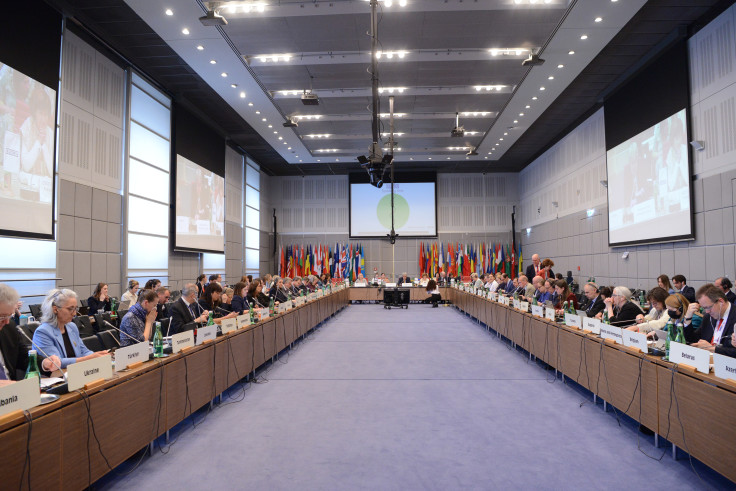OSCE media freedom report highlights 'alarming trend towards authoritarianism'
The OSCE Representative on Freedom of the Media has presented a her bi-annual report to the OSCE Permanent Council. It highlights concerning trends towards authoritarianism.

The post-cold war "promise" of a more democratic global order "where people could live in freedom, prosperity and peace, is crumbling." That is the message of Teresa Ribeiro, the Representative on Freedom of the Media for the OSCE (Organization for Security and Co-operation in Europe).
The OSCE is an intergovernmental security organisation compromised by 57 member-states, spanning Europe, Central Asia and North America. Its membership includes the US, Russia, Britain, Germany, and France. The security concerns of the OSCE cover three areas: the politico-military; the economic and environmental; and the human.
On the 11th of May the OSCE Permanent Council were presented with Ribeiro's bi-annual report which outlines media freedom trends throughout the OSCE region.
The publication of the report followed World Press Freedom day on the 3rd of May, with this year marking the 30th anniversary of the event. In response, the UK Delegation to the OSCE stated the need to acknowledge that the number of "violations of media freedom" is too high within OSCE territory.
Britain's statement was published on the same day as the coronation of King Charles, where the arrest of protestors has created ongoing controversy. Leader of Republic, Graham Smith, has claimed that "the right to protest peacefully in the UK no longer exists."
Moreover, moving back to the report, Ribeiro explains that "an alarming trend towards authoritarianism" is observable, combined with "a backsliding of human rights in various established and emerging democracies".
American political scientist Francis Fukuyama famously argued in his 1992 book "The End of History and the Last Man" that progress towards political and economic liberalism would mark the end of history. That is, the end of mankind's ideological struggle, with the clash between Soviet communism and Western liberal democracy dominating the cold war period prior to the 1990s.
However, 30 plus years on, the reality seems somewhat more dystopian, with Ribeiro referring to a "global decline in democracy" in her report. According to her report, a key element of the trend towards authoritarianism is the "repression of civil society and censorship of independent media". Furthermore, last year the frequency at which journalists and media workers were both killed and imprisoned saw "a global spike".
The challenges to democracy highlighted in the report include increasing polarisation, diminishing trust in political institutions, extremist movements, populism, and "parallel realities, where facts do no longer matter".
Crucially, where the media environment becomes more saturated with false information and narratives which distort the truth and provide an unbalanced image of the world, trust in democracy is put at risk. If citizens cannot trust the media, their trust in the political systems in which they live is also put at risk.
More specifically, concerns exist that media freedom is being sacrificed in the name of national security. National security concerns derive from the impact of "foreign information manipulation" and disinformation on the "information space" of societies. However, Ribeiro states in her report that the right to protect the security of citizens should not be "misused to stifle media freedom".
In Kyrgyzstan, Moldova and Türkiye, Ribeiro explains that she has stepped in on "cases of restrictions to media freedom linked to national security".
The Russo-Ukraine War
One key influence on the characteristics of information flows is the ongoing Russo-Ukraine War. The war has facilitated the "weaponization of information" according to Ribeiro, with the right to free expression being used to disseminate "disinformation and propaganda for war," sowing the seeds of "distrust in the media and other democratic institutions."
Her report highlights how within Russia and Belarus, "the fierce and rigorous repression of free and independent media continues unabated". Media outlets have been forced to close by the dozen, and journalists have been imprisoned facing "horrendous legal charges".
For example, in January this year, Meduza, a popular Russian-language news portal, was declared an "undesirable organization" and banned. Examples of individuals include Alexander Nevzorov, a Russian television journalist, who has been given a prison sentence of eight years. Also, Maria Ponomarenko, a journalist for RusNews, has been setenced to six years in prison.
Action against journalists is also international in scope, with Russia banning 29 British journalists from entering the country.
In Belarus journalists have also been arrested and given lengthy prison sentences according to Ribeiro's report. Furthermore, back in March, the Belarusian Association of Journalists (BAJ), "the leading media freedom organisation in the country", was categorised as an "extremist formation".
© Copyright IBTimes 2025. All rights reserved.





















